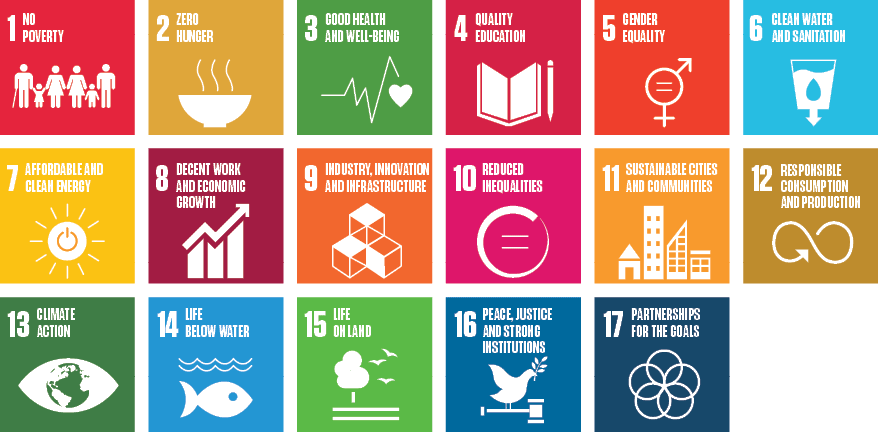Insights
- With the clock ticking, there simply isn’t time for organizations to evolve on a comfortable timeline. The 2030 goal is ambitious. Indeed, the World Economic Forum (WEF) calls for the 2020s to be an exponential “decade of action” — further complicated by the decade beginning with a pandemic.
- The SDGs aren’t goals for the public sector to work toward alone. Recovery and getting back on track will require the private sector’s effort as well. Companies must re-engineer business models to focus on long-term benefits for all stakeholders, rather than short-term financial gains for shareholders, or we will not make enough progress toward the SDGs.
- Without this better kind of capitalism,16 stakeholder capitalism, the 2020s will not be the Decade of Action that the world needs. However, stakeholder capitalism must move from lofty ideals to practical, effective implementation if it is to support sustainable development.
A job left unfinished
In June 2012, the United Nations (UN) held Rio+20, a three-day conference on sustainable development. The Millennium Development Goals (MDGs) were set to expire in 2015, and they needed to develop new goals to address the imminent environmental, political, and economic threats.1
The MDGs accomplished a lot — the global effort lifted over 1 billion people out of extreme poverty and decreased child mortality by more than half. Much more, however, was needed.2 The UN Sustainable Development Goals (SDGs) were thus created to finish what the MDGs started and address even more pressing problems. They were codified in September 2015 and are at the core of the 2030 Agenda for Sustainable Development.3
A set of universal goals
The UN SDGs cover 17 strategic imperatives (see Figure 1), and were adopted by all UN member states as a call to end poverty, safeguard the planet, and guarantee that every person enjoys peace and prosperity by 2030. The goals are interconnected, creating a positive reaction chain across environmental, social, and economic dimensions.
With the clock ticking, there simply isn’t time for organizations to evolve on a comfortable timeline. The 2030 goal is ambitious. Indeed, the World Economic Forum (WEF) calls for the 2020s to be an exponential “decade of action”4 — further complicated by the decade beginning with a pandemic.
Figure 1. The UN Sustainable Development Goals

Source: United Nations.
The AC/BC era
In the preface to his latest book, WEF founder and executive chairman Klaus Schwab reflects on his first call about COVID-19. Schwab describes the call from Beijing as “an AC/BC moment, when attention shifted from the time before COVID-19 to the reality that set in after COVID-19.”5

One thing has changed in the interim period between ‘BC’ and ‘AC’ … a greater understanding among the population, business leaders, and government that creating a better world would require working together.6
One year later, it’s clear that Schwab was right. In the AC era, the need to work together over the next decade has never been clearer.7
Where are we in the “Decade of Action”?
We are also one third of the way through the SDG journey — how close are we to meeting the 2030 goal?
In the forward to the latest annual SDG update, António Guterres — the UN Secretary-General — admits that, “Before the COVID-19 pandemic, progress remained uneven and we were not on track to meet the Goals by 2030.”8 In Policy Brief #81,9 the UN’s Department of Economic and Social Affairs found that, in the AC era, progress has been hindered by
- A rise in food insecurity, with 2 billion people facing moderate or severe food insecurity. This doesn’t bode well for Goal 2.
- Up to 90% of students taking classes remotely or not at all, causing renewed pressure on Goal 4. As a result of school closures, 370 million children lost out on school meals, another slight to Goal 2, and 70 countries reported disruption to or suspension of child vaccinations.
- COVID -19 overwhelming health systems, plus a global maternal mortality ratio still half the rate needed to reduce the target for maternal deaths by 2030 — meaning we will fail Goal 3.
- Amplified pressure on Goals 1, 2, 8, and 9 because business closures and fragile supply chains created an economy that lost 114 million jobs, put 120 million people back into extreme poverty, and left 132 million undernourished.
- Goal 5 is compromised by some countries experiencing a 30% increase in domestic violence.
A missed opportunity
Governments across the globe spent a record $16 trillion to recover from the economic fallout from COVID-19. The United Nations Conference on Trade and Development (UNCTD) studied the stimulus packages of the 2008 Great Recession and the 2020 COVID-19 pandemic. Specifically, they analyzed whether stimulus packages in 20 countries and the European Union were structured to target structural and economic reform across 3 SDGs (see Figure 2):
Figure 2. SDGs hindered in the after-COVID era

Source: United Nations.
- Goal 2 (zero hunger, improved food security, and sustainable agriculture),
- Goal 5 (gender equality and women’s empowerment), and
- Goal 7 (affordable and clean energy).
While the 2020 COVID-19 stimulus packages were much larger than those in 2008, the UNCTD study found that they were less targeted toward goals that directly impact basic human needs. This was a lost opportunity to meet the 2030 SDG target and millions will continue to be marginalized.10
Governments worldwide have spent a record $16 trillion to recover from the economic fallout caused by COVID-19
Is it any wonder António Guterres has called for “renewed ambition, mobilization, leadership, and collective action, not just to beat COVID-19 but to recover better, together”?11
To rebuild better
This pandemic has illustrated one point clearly: Disasters affect us all, without regard to borders or country development. Liu Zhenmin, Under-Secretary-General for the Department of Economic and Social Affairs, explained, “To rebuild better, both the public and private sectors must invest in human capital, social protection, and sustainable infrastructure and technology.”12
The SDGs aren’t goals for the public sector to work toward alone. Recovery and getting back on track will require the private sector’s effort as well. Companies must re-engineer business models to focus on long-term benefits for all stakeholders, rather than short-term financial gains for shareholders, or we will not make enough progress toward the SDGs.
On its fiftieth anniversary, the WEF theme for 2020 was “Stakeholders for a Cohesive and Sustainable World.” To support this objective, the organization developed its “Davos Manifesto 2020: The Universal Purpose of a Company in the Fourth Industrial Revolution,” and redefined a company’s role in society:
“The purpose of a company is to engage all its stakeholders in shared and sustained value creation. In creating such value, a company serves not only its shareholders, but all its stakeholders – employees, customers, suppliers, local communities, and society at large. The best way to understand and harmonize the divergent interests of all stakeholders is through a shared commitment to policies and decisions that strengthen the long-term prosperity of a company.”13
This is stakeholder capitalism, where companies focus on long-term value for all stakeholders.14
The new path forward
In effect, on January 2020, Schwab declared the world was at an inflection point. Since then, however, COVID-19 has driven us far off the course of sustainable development and the UN SDG’s 2030 delivery. In the words of António Guterres, the pandemic “exposed and exacerbated existing inequalities and injustices.”15 If we are to fulfil all 17 SDG goals by 2030, the AC era has ushered in a time that requires more — more commitment, more focus on stakeholders, and more ambition.
Without this better kind of capitalism,16 stakeholder capitalism, the 2020s will not be the Decade of Action that the world needs. However, stakeholder capitalism must move from lofty ideals to practical, effective implementation if it is to support sustainable development. In the next article of this series, we will delve into what these metrics are, how to adopt and measure them, and how they will support sustainable development.
References
- United Nations Conference on Sustainable Development, Rio+20, United Nations, 2012.
- Sustainable Development Goals: Background on the goals, United Nations Development Programme.
- Transforming our world: The 2030 Agenda for Sustainable Development, Department of Economic and Social Affairs, Sustainable Development, United Nations.
- The Sustainable Development Goals Report 2020, United Nations, July 7, 2020.
- Stakeholder capitalism: A global economy that works for progress, people and planet, Klaus Schwab and Peter Vanham, January 27, 2021, Wiley, p. xiii.
- Stakeholder capitalism: A global economy that works for progress, people and planet, p. xv.
- Financing for Sustainable Development Report 2021, Inter-agency Task Force on Financing for Development, 2021.
- The Sustainable Development Goals Report 2020.
- UN/DESA policy brief #81: Impact of COVID-19 on SDG progress. A statistical perspective, United Nations Department of Economic and Social Affairs, August 27, 2020.
- A comparison of selected stimulus packages in 2008 and 2020: Investing in renewable energy, sustainable agriculture and food security, and gender equality and the empowerment of women for structural economic transformation , United Nations Conference on Trade and Development, December 18, 2020.
- The Sustainable Development Goals Report 2020.
- Pandemic threatens lost decade for development, UN report reveals, March 25, 2021, UN News.
- Davos Manifesto 2020: The universal purpose of a company in the fourth industrial revolution, Klaus Schwab, December 02, 2019, World Economic Forum.
- What is stakeholder capitalism?, Klaus Schwab, January 22, 2021, World Economic Forum.
- UN report finds COVID-19 is reversing decades of progress on poverty, healthcare and education, United Nations, July 7, 2020.
- Why we need the ‘Davos Manifesto’ for a better kind of capitalism, Klaus Schwab, December 01, 2019, World Economic Forum.





